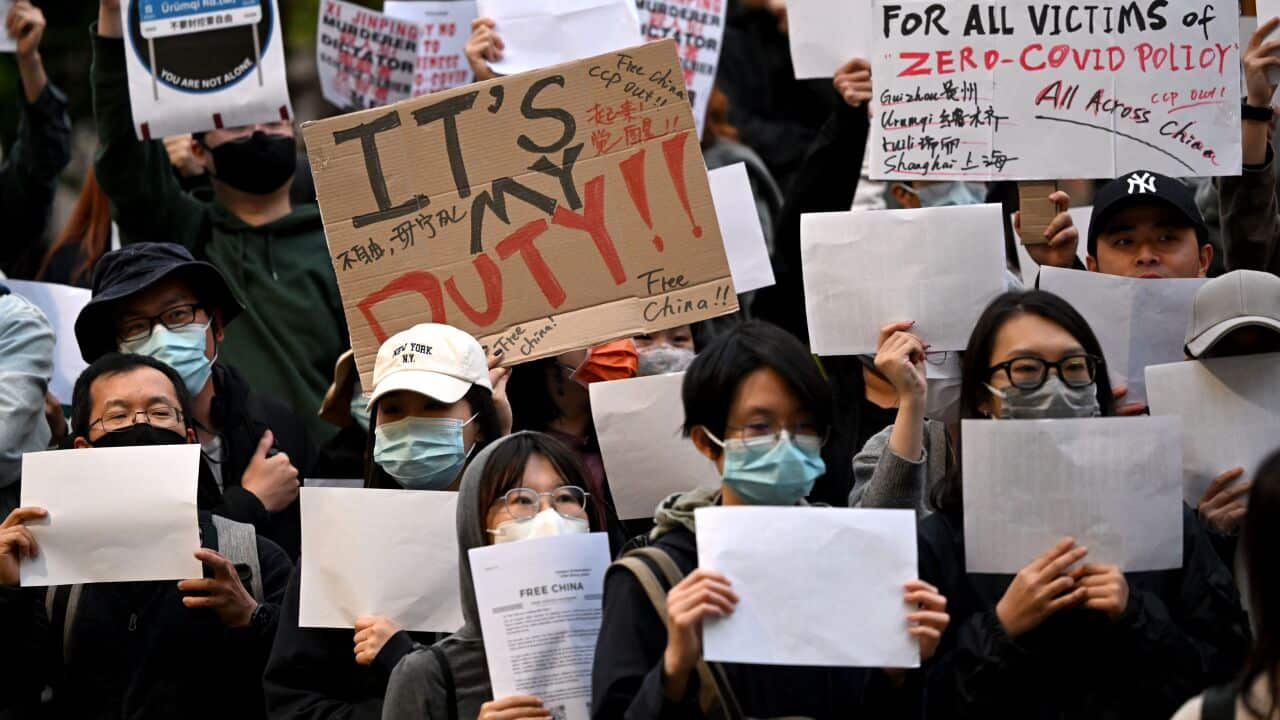Protests against China's strict zero-COVID policy and restrictions on freedoms have spread to at least a dozen cities around the world in a show of solidarity with in China over the weekend.
Expatriate dissidents and students staged small-scale vigils and protests in cities around the world including London, Paris, Tokyo, Sydney and Melbourne.
In most cases, dozens of people attended the protests, though a few drew more than 100, according to a tally by news agency Reuters.
The gatherings are a rare instance of Chinese people uniting in anger at home and abroad.
The protests on the mainland were triggered by a fire in China's Xinjiang region last week that killed 10 people who were trapped in their apartments. Protesters said lockdown measures were partly to blame, though officials denied that.
On Monday evening, dozens of protesters gathered in Hong Kong's Central business district, the scene of sometimes-violent anti-government demonstrations in 2019.
"I think this is the normal right of people expressing their opinion. I think they should not suppress this kind of right," said Lam, a 50-year-old Hong Kong citizen.

Supporters in Hong Kong hold blank paper in support of the Chinese anti-lockdown protests. Source: AAP, EPA / Jerome Favre
The White House national security council said in a statement the United States believed it would be difficult for China to "control this virus through ," adding, that "everyone has the right to peacefully protest, here in the United States and around the world. This includes in the PRC."
United Nations Human Rights Office spokesperson Jeremy Laurence, in an email on Monday, urged "the authorities to respond to protests in line with international human rights laws and standards."
Mr Laurence added that allowing broad debate across society could "help shape public policies, ensure they are better understood and are ultimately more effective."

A Japanese policeman stands in the middle of the road as a group of protesters (right) hold a peaceful gathering down the street from the Chinese embassy in Tokyo. Source: Getty, AFP / Richard A. Brooks
'Support from abroad'
Since President Xi Jinping assumed power a decade ago, authorities have clamped down hard on dissent, tightening controls on civil society, the media and the internet.
But a strict policy aimed at stamping out with lockdowns and quarantine has become a lightning rod for frustrations. While it has kept China's death toll much lower than those of many other countries, it has come at a cost of long spells of confinement at home for millions and damage to the world's second-biggest economy.
Nevertheless, Chinese officials say it must be maintained to save lives, especially among the elderly, given their low vaccination rates.
Some overseas protesters said it was their turn to take on some of the burden their friends and family had been enduring.

Hundreds of people took to the streets in China's major cities on 27 November to protest against the country's COVID-zero policy in a rare outpouring of public anger against the state. Source: AFP / NOEL CELIS/AFP via Getty Images
"We're now showing support for them from abroad," Ms Chiang said.
A Chinese foreign ministry spokesperson told a regular briefing on Monday that China was not aware of any protests abroad calling for an end to the zero-COVID policy.
Asked about the protests at home, the spokesperson said the question did not "reflect what actually happened" and said China believed the fight against COVID-19 would be successful with the leadership of the party and the cooperation of the people.









